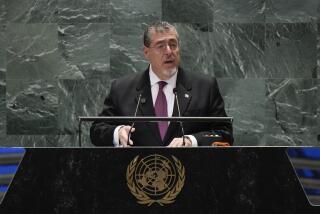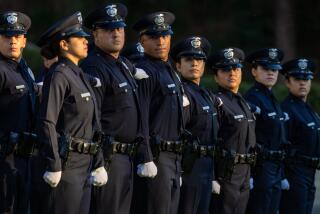U.S. Training of Foreign Police Backfires
- Share via
Congress is expected to vote next month on the Reagan Administration’s proposal to grant $54 million for hardware and “counter-terrorism” training that supposedly will bring security and democracy to Central America by professionalizing its police.
Before granting more money for police training, Congress should review the history of these programs. U.S. training of foreign police has improved neither the security of those nations’ citizens nor the democratic practices of the police and security forces.
This type of training is not new. In the 1930s police from various Latin American countries came to learn detective skills at major urban police departments from New York City to Los Angeles. After World War II the biggest police-training programs were conducted by the U.S. military in the Philippines and occupied Japan.
The first worldwide U.S. effort at police training began in 1955, during the Eisenhower Administration, operating in 26 countries with a budget of $10.2 million. The first such programs were in Guatemala and Vietnam, to prop up the Castillo Armas and Ngo Dinh Diem regimes, and in Bolivia, at the time of rising labor conflict.
The best known of the U.S. police-training programs began in 1962, under the Agency for International Development’s Office of Public Safety. It eventually had a budget of more than $50 million, with 400 public-safety advisers in 45 countries. The Office of Public Safety was dismantled in 1974 after congressional hearings uncovered torture, disappearances and killings by U.S.-equipped police forces.
Many U.S. groups have trained foreign police. Under President Dwight D. Eisenhower, much of this training in the United States was carried out by the International Assn. of Chiefs of Police. Training in this country and abroad also was conducted by public-administration and police-science departments at North American universities. The most active, Michigan State, worked closely with the Diem regime to tighten South Vietnam’s security apparatus.
Robert Amory, former deputy director of intelligence at the Central Intelligence Agency, said that the CIA worked closely with various organizations to develop police-training programs. CIA officials reasoned that since “the brains” for police training “are in the CIA . . . we’ll just move those brains over to AID.” The training moved “back and forth between AID and the CIA,” according to Amory.
The U.S. government’s involvement in these training programs historically served as a CIA cover for intelligence-gathering and covert operations. Can Congress be sure that the CIA now will be willing to let the U.S. military control such training, thereby also controlling key intelligence sources in Central America? Congress can block further CIA penetration of U.S. “humanitarian aid” programs to Central America by denying funding for schemes that merely provide cover for CIA operations.
More than 20 years of police assistance to El Salvador have left it with serious internal-security problems, a population terrorized by death squads and a “professional” police force with one of the worst human-rights records in Latin America.
In short, U.S. police training has done the opposite of what it promised. Murat Williams, U.S. ambassador to El Salvador during the Kennedy Administration, told me in an interview last month that U.S. training of Salvadoran police in the early 1960s complicated his efforts to end the turmoil there: How could he represent the United States as favoring progressive change and democracy if it was training police who would keep students, professors, labor organizers, religious workers and peasants from having a voice in their government? Police training demonstrated to the Salvadoran people, in effect, that the United States was against legitimate political and social change in their country.
It should come as no surprise then that some past recipients of U.S. police training have fallen outside our sphere of influence. Yet one of the claims made most frequently by the State Department for police training is that it secures the loyalty of foreign police and security forces to the United States. But one need only look at Libya, Iran, South Vietnam and Nicaragua--all recipients of almost two decades of police training--to recognize the error of that assumption.
One serious flaw in these programs is that it is almost impossible to monitor how our training and equipment are used locally. Portable radios have been used for torture, riot training and equipment to silence political protest, and improved surveillance techniques to violate the civil liberties of citizens.
But some members of Congress still have faith in the program. In a Dec. 25 letter to the New York Times, Sen. Richard G. Lugar (R-Ind.), chairman of the Senate Foreign Relations Committee, said that his committee was “painfully aware of past abuses” attributed to our police-assistance programs. But he argued that today conditions have changed substantially because Guatemala and El Salvador recently elected presidents who had been targets of police abuses. Thus Lugar believes that these leaders now may want U.S. assistance in reforming police practices. The irony is that the police forces that used unsavory tactics against these men had undergone many years of U.S. training.
What U.S. police training has done, and will continue to do, is alienate the very segments of Central American societies--students, mothers of the “disappeared,” religious workers, progressive politicians--who want to create democratic societies. History teaches us many lessons. Congress should look carefully at the lessons that we should have learned from previous police-training programs.
More to Read
Sign up for Essential California
The most important California stories and recommendations in your inbox every morning.
You may occasionally receive promotional content from the Los Angeles Times.













